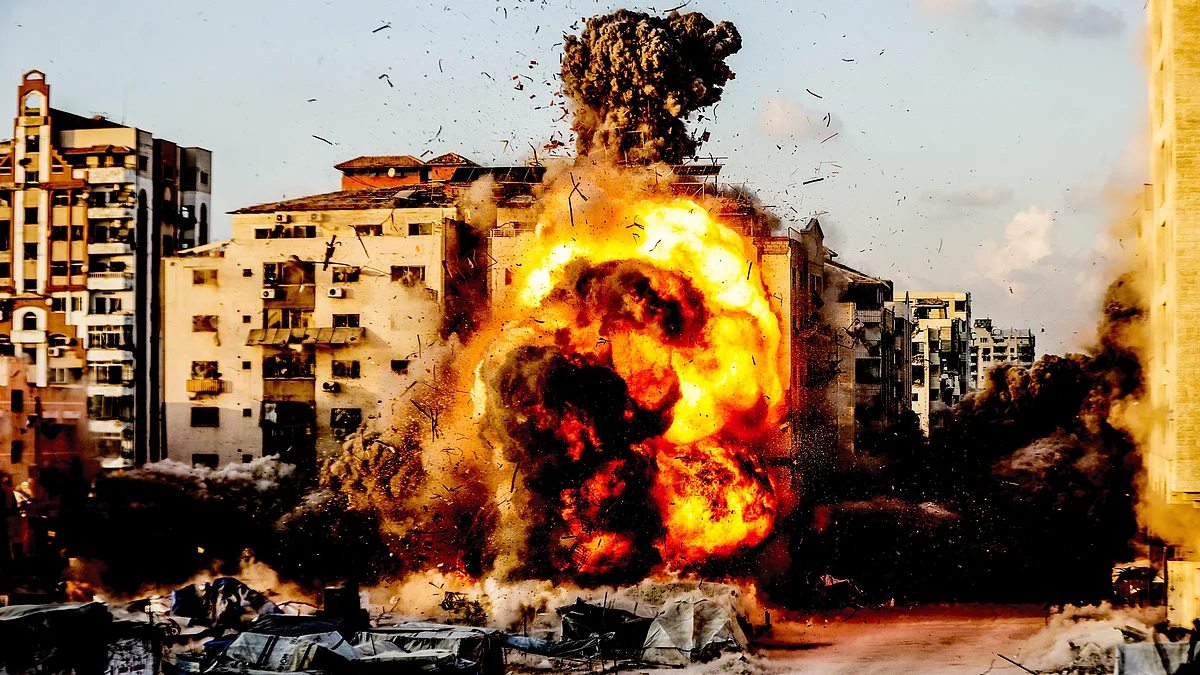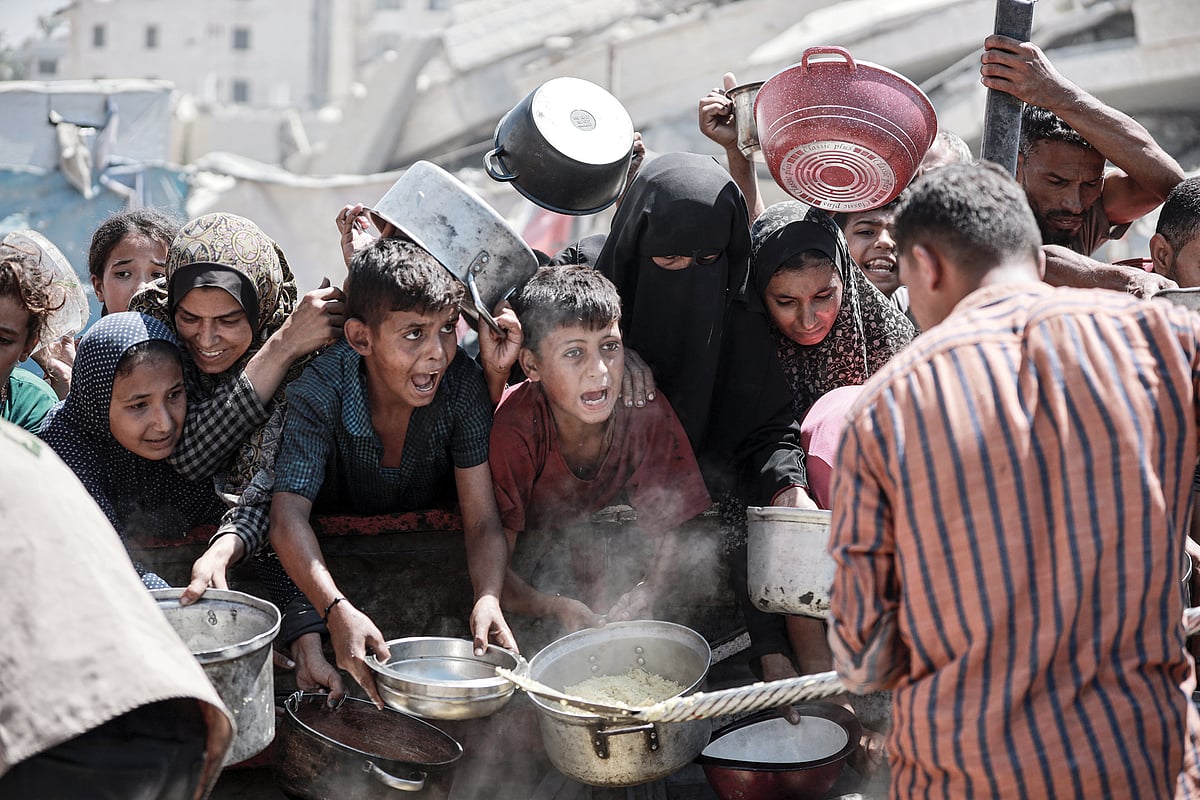Israel–Palestine conflict: Words just fail!
The genocide of Gaza makes one wonder if the world has ever seen such extremes of impunity and apathy at the same time, writes Ashok Swain

For nearly two years, the world has watched Gaza descend into an abyss of human suffering so extreme that it has stripped bare the pretence of global diplomacy. Sixty-five thousand Palestinians are dead, more than 163,000 wounded, and famine afflicts half a million people. Nearly 400 have already perished from malnutrition, 134 of them children. Israel has reduced Gaza to rubble, its hospitals, homes and schools pulverised, its journalists silenced, its population starved.
In the name of self-defence, Israel has also bombed Lebanon, Jordan, Syria, Yemen, Iran and most recently Qatar. Yet the United Nations remains paralysed, Western governments repeat bromides about Israel’s right to self-defence, and they shield Tel Aviv from accountability while arming it to the teeth. What is unfolding in Gaza is not a failure of mediation or the collapse of talks, it is the moral bankruptcy of global diplomacy itself.
Israel’s plan is all too clear: occupy Gaza fully, displace its people permanently, and extinguish the Palestinian national project. Prime Minister Benjamin Netanyahu openly declares his plan of reoccupation, while his far-right coalition partners salivate over resettling Gaza with Jewish colonies and forcing Palestinians into ‘voluntary emigration’. The euphemisms don’t veil the reality of mass expulsion, apartheid and genocide.
Israel now controls 75 per cent of the Gaza Strip, much of it declared buffer zones or no-go areas, and is meticulously razing Gaza City ahead of a ground offensive that humanitarian agencies warn will be catastrophic. The Israeli army has issued evacuation orders for all Palestinians from the city.
The International Association of Genocide Scholars has declared that Israel’s war meets the legal definition of genocide under the 1948 Convention. The International Criminal Court has issued arrest warrants for Israeli leaders, charging them with war crimes and the weaponisation of starvation. Yet Israel continues, shielded, emboldened, even rewarded.
****

Also Read: Why the US can but won’t stop Israel
What does diplomacy look like in this nightmare? The West refuses to pressure Israel, demanding Hamas’s surrender while blocking UN ceasefire resolutions. The US threatens sanctions not on the State starving children but on international judges investigating it. European capitals, having condemned Russia’s atrocities in Ukraine with righteous fury, now mumble ‘restraint’ and ‘balance’ when faced with Gaza’s mass graves.
Arab governments that normalised relations with Israel under the Abraham Accords issue warnings about ‘red lines’ in the West Bank but do little to stem the carnage in Gaza. Their impotence is not accidental; it’s the outcome of a cynical calculus of arms sales and strategic alliances, which outweighs the collateral damage — the lives of children buried under rubble or wasting away in famine camps.
The children are the measure of this horror. In Gaza today, they do not dream of school or play; they plan their own funerals. Actor Liam Cunningham recently showed a video of a young girl, Fatima, singing about her funeral arrangements. Four days later she was dead. What does it even mean when children prepare for their own death while global leaders insist they are working tirelessly for peace?
Israel has systematically bombed food warehouses, destroyed bakeries and blocked aid convoys. It has targeted humanitarian workers and journalists. Nearly 270 journalists, all Palestinians, have been killed, making Gaza the deadliest war for the press in living memory.
Aid ships like the Madleen and Handala have been intercepted in international waters, their cargo seized, their passengers detained. Israeli officials sneer at famine reports, say the death figures are exaggerated and cite ‘other causes’. Starvation, once considered an unthinkable war crime, has become a method of conquest the world apparently can’t stop.
And yet, amid this descent into barbarism, something else stirs. Thousands flocked to the Barcelona port on 31 August to send off the Sumud Flotilla, the largest maritime convoy organised to break the siege. More than 50 ships, carrying activists, doctors, clerics and journalists from 44 countries, set sail with food, water and medicine. They know they may be intercepted, attacked, imprisoned.
Also Read: Just hollow words till there’s real action
Previous flotillas have been raided, drone attacks directed at their decks, passengers killed. And still they sail. The Arabic word sumud, or steadfast perseverance, is apt — it captures the spirit of non-violent defiance that Israel’s bombs cannot extinguish.
In European capitals, marchers denounce the hypocrisy of governments that condemn Russia but coddle Israel. On American campuses, students risked police batons and expulsions to demand divestment. In much of the Global South, memories of colonialism sharpen the sense of solidarity with Gaza.
Sadly, though, the Indian government has stood aside, abstaining from UN resolutions that urged States to impose sanctions on Israel. It has made no show of solidarity with the Palestinians, its ‘strategic’ interests entangled, its conscience silenced.
Meanwhile, a grotesque diplomatic theatre continues. Mediators shuttle between Cairo, Doha and Washington, going through the motions of setting up negotiations between a side that fights with F-35s and precision bombs and one that fights back from tunnels; between one that starves children and another that has been reduced to begging for grain and getting shot in the bargain. The talks collapse because Israel’s backers have ruled out the only outcome Palestinians demand — a free country.
Israel may yet succeed in occupying Gaza, bulldozing its neighbourhoods and expelling its people. But it has lost legitimacy.
What will history record? That the world’s most powerful States presided over the erasure of Gaza; that a famine was engineered in full view of satellites; that a population was exterminated while diplomats wrung their hands?
But history will also remember the courage of those who refused to be silenced; the children who sang their last goodbyes; the journalists who died documenting a genocide; the activists who sailed into danger; the marchers who filled the streets across continents… If there is a future in which humanity redeems itself, it will be because of these heroes.
Ashok Swain is a professor of peace and conflict research at Uppsala University, Sweden. More of his writing may be read here
Follow us on: Facebook, Twitter, Google News, Instagram
Join our official telegram channel (@nationalherald) and stay updated with the latest headlines
